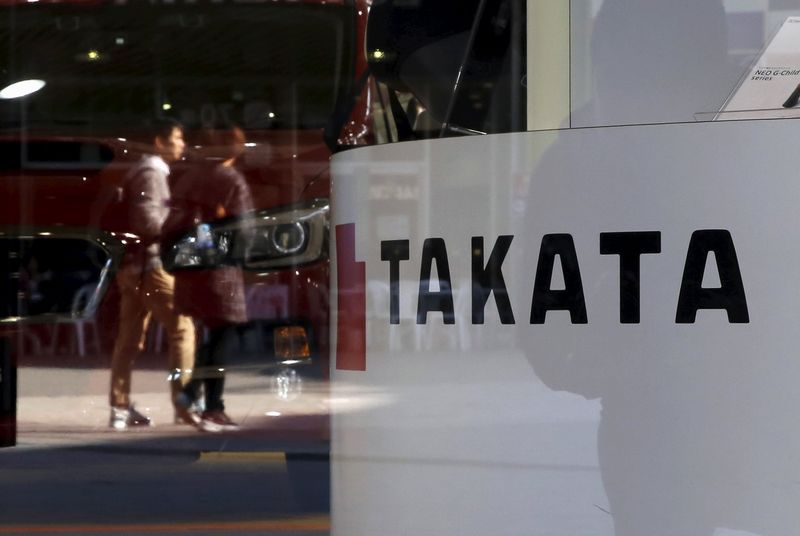(Bloomberg) -- Joyson Safety Systems Japan, a unit of the company that took over failed airbag maker Takata Corp., discovered that falsified production data at its Japanese seatbelt factory was used to pass safety standards for a European certification agency, people with knowledge of the matter said.
The issue comes on top of revelations last week, confirmed by Japan’s transport ministry, that Joyson Safety Systems Japan, or JSSJ, had given faulty data to automakers on seatbelts shipped from its factory in Hikone, Shiga prefecture, which it took over from Takata in 2018. The Nikkei newspaper reported on Oct. 15 that as many as nine million seatbelts supplied by JSSJ to Japanese automakers fell short of strength standards.
JSSJ is ultimately owned by Ningbo Joyson Electronic Corp., the Chinese company whose subsidiary acquired the bankrupt Takata in 2018. The Japanese firm became aware of the faulty inspection data at the Hikone factory in April, with certain data also appearing to have been manipulated to pass product safety requirements imposed by the International Automotive Task Force, a Europe-based certification body, said the people, who asked not to be identified because the information isn’t public. It’s unclear when the alleged data falsification took place, the people said.
“We are investigating the issue and would like to formally address the facts and numbers being circulated by the media, but it is difficult to do so at the moment,” a representative for Hisayoshi Iwamitsu, president of JSSJ, said by phone Oct 16, declining to comment further when asked about the IATF issue.
U.S.-based Joyson Safety Systems, JSSJ’s immediate parent, dominates about 30% of the global seatbelt market, competing with other auto-parts makers such as Sweden’s Autoliv (NYSE:ALV) Inc. and Germany’s ZF Friedrichshafen AG. A seatbelt recall in Japan could potentially impact 2 million vehicles, according to the Nikkei.
Reputational Risk
Evidence of further issues at the factory could put the manufacturer at risk of losing the confidence of customers and businesses globally. The faulty seatbelt data underscores the painful legacy left by Takata, which filed for bankruptcy three years ago after it supplied more than an estimated 100 million defective airbags worldwide.
What Takata’s Bankruptcy Means for Airbag Recalls: QuickTake Q&A
After the Nikkei’s revelations, Joyson Safety Systems said it is looking into “reporting inaccuracies” at the Hikone factory, according to a statement last week from company spokesman Bryan Johnson.
“The reporting issues arose long before the acquisition of the plant from Takata in April 2018,” Johnson said in the statement, posted on the parent company’s website Oct. 14. “JSS is currently reviewing available and relevant data over a 20-year period on a test-by-test and product-by-product basis, which is a substantial undertaking. The investigation is ongoing and JSS is focused on clarifying the issues with urgency to identify the causes and take appropriate corrective measures.”
Global Users
The “data integrity issue” flagged in media reports mainly occurred between 2000 and 2010, when the factory belonged to Takata, Ningbo Joyson Electronic said in a statement to the Shanghai stock exchange Monday. The company is looking into practices after it took control of the plant.
A spokesman for the transport ministry said it was investigating the case following the Nikkei report.
The audit and supervisory committee established to strengthen governance at JSSJ after it assumed control of Takata’s operations had sought for an inquiry into the seatbelt issue, people with knowledge of the probe said. JSSJ’s corporate disclosure documents show that several members of the committee left their positions on Aug. 20.
Standards such as “IATF 16949” set by the organization are designed to prevent product defects and differences in quality throughout production, and are considered a prerequisite for supplying equipment to automakers. BMW, Daimler AG (DE:DAIGn), Fiat-Chrysler Automobiles NV, Ford Motor (NYSE:F) Co., General Motors Co (NYSE:GM)., Jaguar Land Rover Automotive Plc, Peugeot SA (PA:PEUP), Renault (PA:RENA) SA (OTC:RNLSY), Volkswagen AG (OTC:VWAGY) and various trade associations are members of IATF.
Child Seats
Takata’s annual sales before declaring bankruptcy were about 660 billion yen ($6.3 billion). Ningbo Joyson Electronic reported sales of 61.7 billion yuan ($9.2 billion) last year, the bulk of which came from JSS, based in Auburn Hills, Michigan.
The Nikkei newspaper also reported Oct. 15 that there was evidence of tampering with data for seatbelts used in child-safety seats at the Hikone factory.
The Takata scandal unleashed one of the most significant recalls in automotive history. The company sold defective air bag inflators using ammonium nitrate, which were at risk of exploding violently in a crash and injuring passengers with metal shards. They were linked to at least 23 deaths worldwide and more than 200 injuries in the U.S. alone. Takata pleaded guilty to a wire-fraud charge as part of a $1 billion settlement with the U.S. Justice Department over the air-bag problems, and later went out of business.
©2020 Bloomberg L.P.
